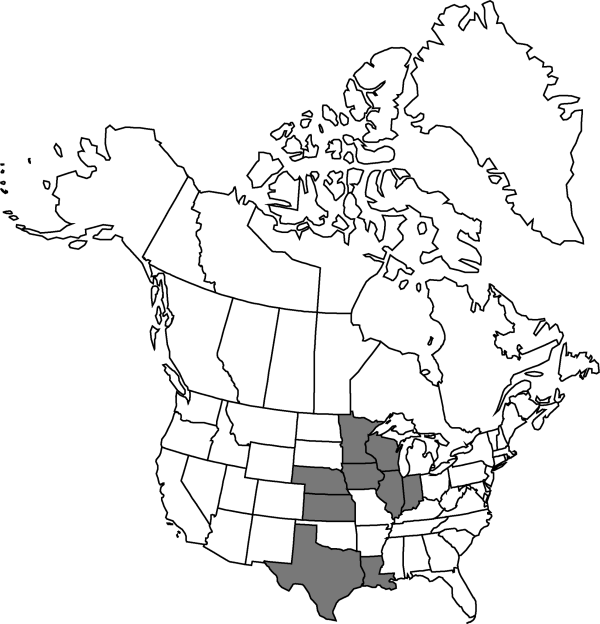Difference between revisions of "Phemeranthus rugospermus"
Novon 11: 320. 2001.
FNA>Volume Importer |
FNA>Volume Importer |
||
| Line 27: | Line 27: | ||
|elevation=0-500 m | |elevation=0-500 m | ||
|distribution=Ill.;Ind.;Iowa;Kans.;La.;Minn.;Nebr.;Tex.;Wis. | |distribution=Ill.;Ind.;Iowa;Kans.;La.;Minn.;Nebr.;Tex.;Wis. | ||
| − | |discussion=<p>Within the overall area of its distribution, Phemeranthus rugospermus is nowhere abundant, its occurrence being everywhere spotty and localized. According to T. S. Cochrane (1993), the disjunctions probably reflect a history of long-distance dispersal from a center in the partially unglaciated Kansas and Nebraska sandhills, the present-day gaps resulting from a paucity of suitable habitats between that area and the others where it is now found. Even so, its discovery in Missouri, Arkansas, and/or Oklahoma would not be surprising.</p> | + | |discussion=<p>Within the overall area of its distribution, <i>Phemeranthus rugospermus</i> is nowhere abundant, its occurrence being everywhere spotty and localized. According to T. S. Cochrane (1993), the disjunctions probably reflect a history of long-distance dispersal from a center in the partially unglaciated Kansas and Nebraska sandhills, the present-day gaps resulting from a paucity of suitable habitats between that area and the others where it is now found. Even so, its discovery in Missouri, Arkansas, and/or Oklahoma would not be surprising.</p> |
|tables= | |tables= | ||
|references={{Treatment/Reference | |references={{Treatment/Reference | ||
| Line 57: | Line 57: | ||
|publication year=2001 | |publication year=2001 | ||
|special status= | |special status= | ||
| − | |source xml=https://jpend@bitbucket.org/aafc-mbb/fna-data-curation.git/src/ | + | |source xml=https://jpend@bitbucket.org/aafc-mbb/fna-data-curation.git/src/8f726806613d60c220dc4493de13607dd3150896/coarse_grained_fna_xml/V4/V4_1004.xml |
|genus=Phemeranthus | |genus=Phemeranthus | ||
|species=Phemeranthus rugospermus | |species=Phemeranthus rugospermus | ||
Revision as of 17:25, 18 September 2019
Plants to 2.5 dm; roots elongate, fleshily woody. Stems ± erect, simple or sometimes branching. Leaves sessile; blade terete, to 6 cm. Inflorescences cymose, much overtopping leaves; peduncle scapelike, to 15 cm. Flowers: sepals deciduous, ovate, 4 mm; petals pink to magenta, ovate to obovate, sometimes mucronulate, 6.5–8 mm; stamens 12–28; stigmas 3, spreading widely, linear, 1/2–1/3 as long as styles. Capsules subglobose, 4 mm. Seeds without arcuate ridges, 1.2 mm, corrugate-rugulose overall. 2n = 24.
Phenology: Flowering May–Aug.
Habitat: Sand or sandy soils, dunes, mounds, flats, banks, ridges, edges of igneous or metamorphic rock outcrops, along or near watercourses
Elevation: 0-500 m
Distribution

Ill., Ind., Iowa, Kans., La., Minn., Nebr., Tex., Wis.
Discussion
Within the overall area of its distribution, Phemeranthus rugospermus is nowhere abundant, its occurrence being everywhere spotty and localized. According to T. S. Cochrane (1993), the disjunctions probably reflect a history of long-distance dispersal from a center in the partially unglaciated Kansas and Nebraska sandhills, the present-day gaps resulting from a paucity of suitable habitats between that area and the others where it is now found. Even so, its discovery in Missouri, Arkansas, and/or Oklahoma would not be surprising.